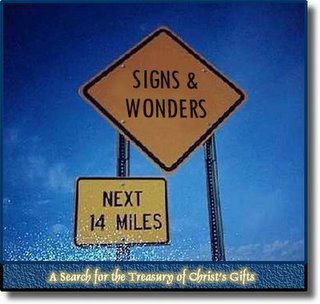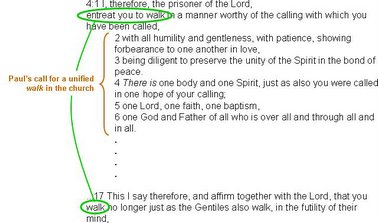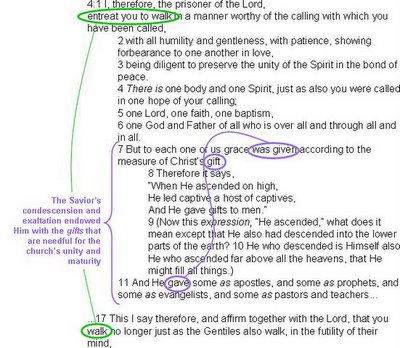
- Introduction & Rules for this Series.
- Is the Question of Cessationism/Continuationism Worth a Discussion?
- The Absolute Sufficiency of God’s Word.
- God’s Providence in History: A Punctuation of the Miraculous.
- And He Gave Gifts: An Evaluation of Ephesians 4.
- Understanding 1 Corinthians 12-14: The Fruit of the Spirit is Love.
- Arguments of Omission and NT Revelation.
- A Brief Comment About Church History.
- Conclusion.
In my introductory post, I promised to take my time in getting to this series. The very fact that this introductory post was made nearly three weeks ago proves that I have already fulfilled this promise to take my time! But I must say that I do not intend to take this long between posts again; instead, I hope to stay closer to a once/week schedule in the future (Lord willing). I have been extremely busy due to several factors: my privileges as a husband, father, and pastor have taken every ounce of energy over the last month. Clearly, weblogging is an ancillary priority for me! But I do hope to maintain a stronger stride, especially with this series on cessationism/continuationism.
In this post we will consider why the discussion of God’s signs and wonders is important. But first, let us begin by looking into those frequently used terms of cessationism and continuationism. Normally, cessationism and continuationism are labels that are used to identify the question about the duration of God’s supernatural signs and wonders. In addition to this, these terms also bring us into contact with the question concerning the revelatory offices of the Apostles and Prophets. Having said this much thus far, we’ll start off with some very basic questions about the Lord’s signs, wonders and revelatory gifts, as follows:
- “Why does God bring about His supernatural signs and wonders…what purpose do they serve?”
- “Does God accomplish His signs and wonders in the same manner for every generation?”
- “Does God accomplish His signs and wonders with the same frequency in every generation?”
- “If He does not accomplish His signs and wonders with such continuity and regularity, then what expectations should be have concerning the Lord’s signs and wonders?”
These last three questions will obviously govern the majority of our study together (in the posts to come), but for now we will focus on the first question concerning the purpose of God’s signs and wonders. When we consult the Scriptures, we find that the signs and wonders of God serve (at least) four important purposes:
- To disclose God’s glory and power to this world of men, without exception (Psalm 19:1-2, Romans 1:20).
- To render a clear confirmation of His divine revelation (Joel 2:30-32, Luke 21:25-26).
- To affirm His uniquely appointed messengers (Romans 15:18-19, 2 Corinthians 12:12).
- To disclose His glory for all eternity (Revelation 15:1-4).
Much more could be said about the purposes of God’s signs and wonders. For instance, when we say that they serve the purposes of confirming God’s revealed message, along with His messengers, we must subsequently acknowledge that the Lord’s signs and wonders can either serve God’s redemptive purposes (John 4:43-54), or His purposes of judging the wicked (John 12:37-40). We’ll examine those layers of truth later on, but for now we must take a hard look at the aforementioned four points concerning God’s purposes in His signs and wonders. Frankly, just by examining this list, we should conclude that the discussion is important – without a doubt. After all, to say that the signs and wonders of God point to His glory among men; His special revelation to men; His unique messengers among men; and His glory for all eternity is…extremely significant. Such a first layer of observation helps us to understand that this is not a subject that we should just brush aside in order to avoid controversy. Of course, there will be some who might insist that this is a non-issue and that we should all just “live and let live.” Well, some subjects are worthy of deep study and a thorough defense, and this is certainly one of them.
As already stated, when we address the subject of God’s signs and wonders, it is necessary to address the matter concerning the Lord’s revelatory gifts as well: particularly, do we still have apostles and prophets today? Some will say that there are no apostles, but that there are prophets; some will say that both offices remain with us today, while others will say that both have ceased.
Are these important questions for us to answer? Absolutely!
The offices of Prophet and Apostle have a very important valuation assigned to them. Because of this valuation, we ought to consider the question of their continuation or cessation with great care, after all, the maturity of the church is at stake in these very questions:
Ephesians 4:1-12: 1 Therefore I, the prisoner of the Lord, implore you to walk in a manner worthy of the calling with which you have been called, 2 with all humility and gentleness, with patience, showing tolerance for one another in love, 3 being diligent to preserve the unity of the Spirit in the bond of peace. 4 There is one body and one Spirit, just as also you were called in one hope of your calling; 5 one Lord, one faith, one baptism, 6 one God and Father of all who is over all and through all and in all. 7 But to each one of us grace was given according to the measure of Christ’s gift. 8 Therefore it says, “When He ascended on high, He led captive a host of captives, And He gave gifts to men.” 9 (Now this expression, “He ascended,” what does it mean except that He also had descended into the lower parts of the earth? 10 He who descended is Himself also He who ascended far above all the heavens, so that He might fill all things.) 11 And He gave some as apostles, and some as prophets, and some as evangelists, and some as pastors and teachers, 12 for the equipping of the saints for the work of service, to the building up of the body of Christ;
Paul’s epistle to the Ephesians has a similar structure to many of his other letters. It begins with a doctrinal section (chapters 1-3) and then ends with an exhortation to apply such doctrine (chapters 4-6). This is why the Apostle uses the word “walk” 5 times in chapters 4-6 – his chapters on application. In other words, the Ephesian believers were to take the Apostle’s doctrinal instructions and then walk in accordance with God’s sovereign calling in their life. Notice the way in which he begins this important section on application:

His exhortation to walk in the manner of godly living (according to the calling with which they were called, chapters 1-3) is foundational to his overall thrust in the latter portion this epistle. These instructions to the church at Ephesus remind us that all believers are to walk in a manner that is in keeping with God’s calling; as well, such a walk is therefore contrary to our former manner of life (Ephesians 2:1-3, 4:17). Thus, as believers we are to walk in love after the pattern of Christ (Ephesians 5:2); we are to walk as the children of light, rather than in the darkness of this world (Ephesians 5:8); as well, we are to walk in wisdom, rather than in foolishness (Ephesians 5:15). Next, Paul exhorts believers to this walk of wisdom so that we would engage in godly relationships within the church (Ephesians 5:18-21); in our marriages (Ephesians 5:22-33); with our children (Ephesians 6:1-4); and within the world (Ephesians 6:5-18). But before he launches into these important exhortations, Paul helps us to understand all that the Lord has done in order to establish the unity and maturity of the body of Christ:


In verse 8, Paul supplies us with a brief reference to Psalm 68 which supplies an important and historic picture of Jehovah’s conquest over His enemies. By citing this text, Paul helps us to see the Savior’s victory, through His death and ascension, such that He (Christ) was endowed with the spoils of His conquest (Psalm 68:18) sufficient to supply the church with what she needs. Thus, by these endowments of Christ, the church is equipped with everything that she needs in order grow, mature and to proceed in the battles of daily life (Ephesians 6:10-18). Thus the gifts that He obtained through His death, burial and resurrection have been bestowed upon the church through the Holy Spirit’s work in her midst, and through the Apostles, Prophets, Evangelists and pastors-teachers. Here is an important valuation indeed. When we speak of Christ’s gifts to the church, along with the …and He gave some as apostles, and some as prophetsaccompanying signs and wonders that were given with Christ’s messengers, we understand that we are speaking of the very value of Christ’s own sacrifice which He made on our behalf. What we cannot forget is that His sacrifice not only purchased our salvation in Him, but it also procured the very gifts and riches that have been endowed to His church on this earth – and we are called to spend these riches liberally for the preservation of the unity of the body of Christ: for His glory, and for our Gospel testimony in this world.
In view of all this, I contend that this is not a discussion that should be brushed aside as though it were unimportant!
There is no greater price tag that could be assigned to this discussion concerning Christ’s gifts to the church – I can assure you! Paul’s evaluation of Christ’s gifts should increase our sense of sobriety when discussing the question of cessationism or continuationism. This is why we have begun with a survey of Ephesians chapter 4, for this text answers the question concerning the high value of this discussion about the treasury of Christ’s gifts, as well as the signs and wonders that He has given for the sake of His glory, His message, and His messengers.
